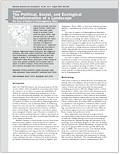| Journal Article |
 |
|
| Article Title | The Political, Social, and Ecological Transformation of a Landscape. The Case of Rubber in Xishuangbanna, China | | Author | Xu Jianchu | | Year | 2006 | | Journal Title | Mountain Research and Development | | Institution | the International Mountain Society (IMS) | | Volume | 26 | | Issue | 3 | | Pages | 254–262 | | Call Number | JA0611-15 | | Keywords | Shifting cultivation, legible landscape, legitimate landscape, rubber plantation, Southeast Asia, China |
|
| Abstract: |
| Driven by economic and ideological
policies, rubber plantations
have been established
in southern China
since the early 1950s. Rubber
was seen as a perfect
way to modernize the “primitive”
shifting agricultural
practices of indigenous
minorities and to “legitimize”
the landscape according to
new Maoist State ideals.
However, large-scale rubber production was dogged by
problems, and most rubber production now emanates
from smallholders, challenging the state notion that
“bigger is better.” In the transition to a free market,
smallholder rubber farms, which grow a wider variety of
crops, have greater flexibility and are better able to
adjust to market changes. These small mixed farms
also enhance ecological and cultural diversity. |
|
|
Download file(s): Click icon to download/open file.
|
| |
File Size |
Description |

|
791 KB |
Softcopy |
|
|
|
| Viewed in 472 times. Downloaded in 481 times. |